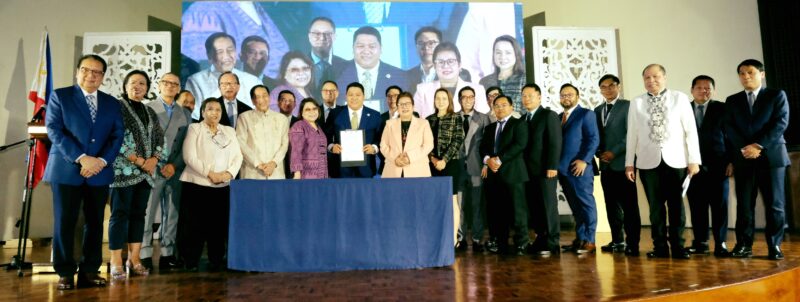-
The Bureau of Customs has released procedures implementing the Convention on Temporary Admission (Istanbul Convention), also known as ATA Carnet System, in the Philippines
-
Customs Memorandum Order No. 08-2024 implements Customs Administrative Order No. 02-2022, which provides the rules and regulations in the implementation of the ATA Carnet System
-
CMO 08-2024 provides the scope of application in the implementation of the ATA Carnet system
-
It also provides procedures in the exportation and re-importation of temporarily admitted goods covered by ATA Carnets that are issued by the Philippine Chamber of Commerce and Industry
The Bureau of Customs (BOC) has released procedures implementing the Convention on Temporary Admission (Istanbul Convention), also known as ATA Carnet System, in the country.
Customs Memorandum Order (CMO) No. 08-2024 implements Customs Administrative Order (CAO) No. 02-2022, as amended by CAO 01-2023, which provides the rules and regulations in the implementation of the ATA Carnet System.
The CMO took effect immediately when it was signed by Customs Commissioner Bienvenido Rubio during the official launch of the system on July 15 and was published recently on BOC’s website.
READ: ATA Carnet officially launched in PH
The ATA Carnet System is an international scheme that allows the temporary admission and tax- and duty-free importation of commercial samples, professional equipment, and articles for presentation or use in trade fairs, shows, and exhibitions.
The ATA Carnet, sometimes referred to as the “passport for goods,” is a single document that will pass through several customs territories and will be valid up to one year. ATA is an acronym of the French and English words “admission temporaire/temporary admission,” while carnets are referred to as “passports for goods” or “merchandise passports.”
BOC earlier said the introduction of ATA Carnet system is expected to yield numerous benefits, including increased participation in international fairs and exhibitions, greater ease for professionals traveling with equipment, and a significant reduction in the administrative burden associated with temporary imports.
CMO 08-2024 provides the scope of application in the implementation of the ATA Carnet system in the country. It also provides the procedures in the exportation and re-importation of temporarily admitted goods covered by ATA Carnets that are issued by the Philippine Chamber of Commerce and Industry (PCCI), which is the appointed National Issuing and Guaranteeing Association (NIGA) by BOC.
The NIGA is the association affiliated to a Guaranteeing Chain and accredited by BOC to issue Temporary Admission Papers (TAPs) and to guarantee the amount of security and other charges to be imposed. Only one NIGA is appointed by BOC.
TAPs, meanwhile, are international customs document accepted as a customs declaration which makes it possible to identify goods and which incorporates an internationally valid guarantee to cover import duties and taxes.
Under CMO 08-2024, the processing of ATA Carnet should be limited to goods eligible for temporary admission as provided under CAO 02-2022, which includes the following:
- Goods for display or use at exhibitions, fairs, meeting, or similar events
- Professional equipment
- Containers, pallets, samples and other goods imported in connection with a commercial operation, except packings and articles (including vehicles) which, by their nature, are unsuitable for any purpose other than advertising of specific articles or publicity for a specific purpose
- Goods imported in connection with a manufacturing operation
- Goods imported for educational, scientific or cultural purposes. While scientific and pedagogic material is accepted, lodgment/filing of regular goods declaration will be required.
- Travelers’ personal effects and goods imported for sports purposes
- Goods imported for humanitarian purposes
- Animals, except animals for transhumance or grazing or for performance of work or transport
ATA Carnets are accepted for hand-carried goods and unaccompanied goods, but are not accepted for postal traffic and customs transit.
CPD Carnet, known formally as Carnet de Passages en Douane, a customs document for temporary admission of road vehicles, is not accepted.
CMO 08-2024 also lists the sea and airports of entry that can process ATA Carnets.
For seaports, these include the BOC collection districts of San Fernando and subport of Sual, Port of Manila, Manila International Container Port, Batangas and its subports of Siain and Puerto Princesa, Legaspi, Iloilo, Cebu, Tacloban, San Fernando, Surigao, Cagayan de Oro and the subports of Iligan and Mindanao Container Terminal, Zamboanga, Davao, Subic, Limay and its subport of Mariveles, and Aparri.
Airports include Ninoy Aquino International Airport, Puerto Princesa International Airport, Bicol International Airport, Kalibo International Airport, Godofredo P. Ramos Airport (Aklan), Mactan-Cebu International Airport, Bohol-Panglao International Airport, Francisco Bangoy International Airport, Subic International Airport, Clark International Airport, and Laoag International Airport.
Goods covered by an ATA Carnet may be re-exported through a BOC office other than through which they were imported and vice versa.
A regularization fee will be imposed if evidence of re-exportation is not provided by the re-exportation counterfoil duly completed, signed, stamped, and dated by BOC. Regulated goods covered by ATA Carnet require submission of necessary permits and clearances from appropriate regulatory agencies.
BOC’s Tax Exempt Division will serve as the central monitoring office related to all ATA Carnets.
BOC’s Management Information System and Technology Group will develop an ATA Carnet Monitoring System that will serve as the digital repository of ATA Carnets processed by BOC and to monitor the processing of foreign-issued and PCCI-issued ATA Carnets.









